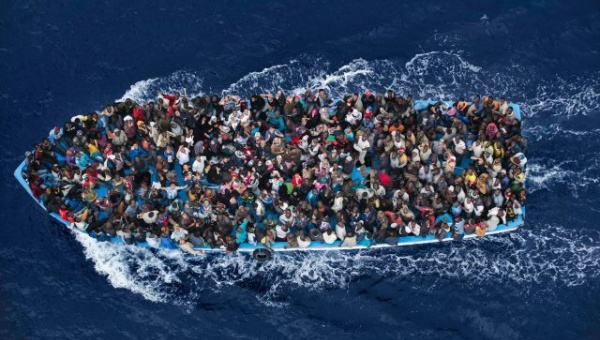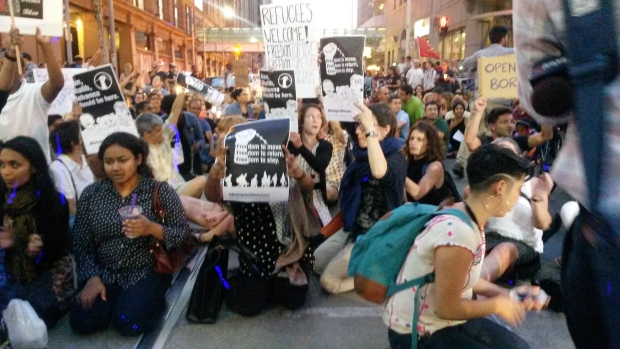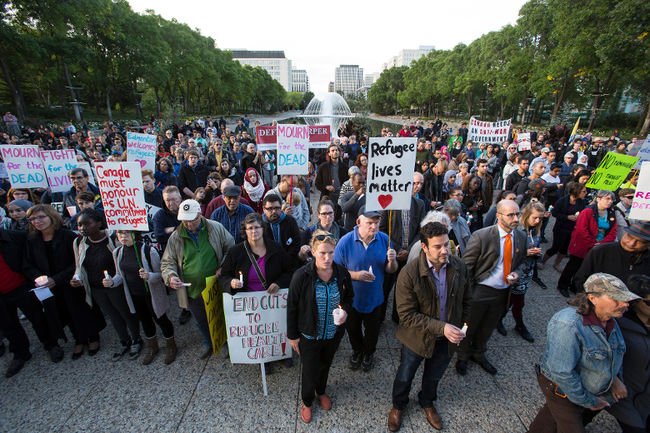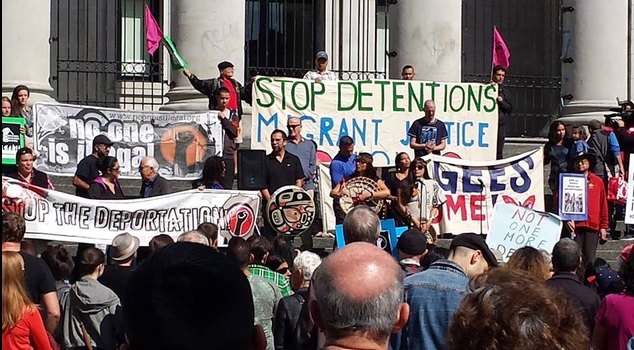
A boat carrying migrants in the Mediterranean, February 12, 2015. | Photo: Reuters
For many of us living in the Western world, the tragic story of the Kurdi family has opened our eyes to a problem that previously seemed far too distant and abstract to process. As we mourn Alan, Ghalib and Rehana, along with the 1,867 others that lost their lives this year while fleeing to Mediterranean shores, we have finally been able to recognize the severity of the Syrian refugee crisis. In a long overdue wave of introspection, we have begun to understand the ways in which our own countries are complicit in worsening this crisis.
In Canada, the federal government currently settles 10,000 refugees a year — a mere 0.001% of the 60 million refugees across the world. This is especially disappointing when other G7 countries like Germany are settling 80 times that number. These staggering statistics, brought to light under tragic circumstances, have sparked public outrage with people across the country taking part in #RefugeesWelcome mobilizations this weekend and calling for an end to a national anti-migrant agenda. Over two dozen rallies were scheduled between September 4th – 9th in cities across the country.

Toronto #RefugeesWelcome Rally on September 4th | Photo: CBC
It’s a crucial first step, but for Canada, taking responsibility doesn’t end at opening up its borders to more refugees. We need to address the fact that the status quo in this country has played a role in accelerating displacement crisis in Syria and around the world.
A study published earlier this year concluded that climate change played a heavy hand in expediting the civil war in Syria. From 2006 to 2011, the worst drought in Syria’s recorded history devastated agricultural lands and triggered a wave of rural to urban migration. This intensified burgeoning social stresses in cities already filling up with refugees from the war in Iraq. The same drought drastically increased food prices, making things even worse. Climate scientist, Richard Seager, explains that “added to all the other stressors, climate change helped kick things over the threshold into open conflict.”
The most disturbing part about all of this, is that this is just the beginning of a displacement crisis that is only growing. Political unrest in the Eastern Mediterranean, along with trends that suggest more, and worse, droughts mean that we can anticipate more climate driven conflict in upcoming years. We can expect the same for other regions that are struggling from unstable politics and resource scarcity. Inevitably, more violence and war will mean higher populations of displaced persons fleeing their homes in search of safety and peace.
Even without factoring in war, climate change on its own has been identified as one of the “most significant drivers of human migration.” The Environmental Justice Foundation estimates that by 2050, there will be a global population of 150 million climate refugees seeking to escape climate disasters in countries like Brazil, Mongolia, Bangladesh, Kenya, Papua New Guinea, Somalia, Yemen, Ethiopia, Chad and Rwanda. Already, 26 million people across the world have been displaced by catastrophic floods, droughts, cyclones and heat waves.
Yet, in the face of these devastating rates of international displacement, countries like Canada have made it clear that refugees are not welcome. The Canadian government hasn’t just closed off its borders to refugees. It has also made Canada an increasingly hostile home for its current refugee population by axing healthcare services for refugees, and making it easier to incarcerate and deport members of these communities.

Edmonton #RefugeesWelcome Rally on Sept 8th | Photo: Ian Kucerak, Edmonton Sun
The tragic circumstances that ended Alan Kurdi’s life can’t simply be labeled as a refugee crisis. We’re observing massive rates of displacement driven by catastrophic changes in the climate while countries, like Canada, that are responsible for accelerating climate change turn away and further marginalize the victims of their business-as-usual activities. This is a global injustice.
It’s saddening to think that humanity must sink to its darkest depths before reality sinks in, but let us hope that this tragic moment in human history is a wakeup call for all of us. It’s about time that the climate movement recognized the connections between the impacts of a warming world, populations being forced from their homes and immigration policies. As we call upon political leaders to make stronger climate action commitments, we must also support and reinforce the efforts of migrant justice groups that have been organizing for years to improve Canada’s refugee inclusion policies. Let this moment serve as a reminder that if we stay silent as our governments launch an assault on the rest of the world, we too are complicit in exacerbating this injustice.

Refugees Welcome Rally in Vancouver Sept 6th | Photo: Harsha Walia (twitter)